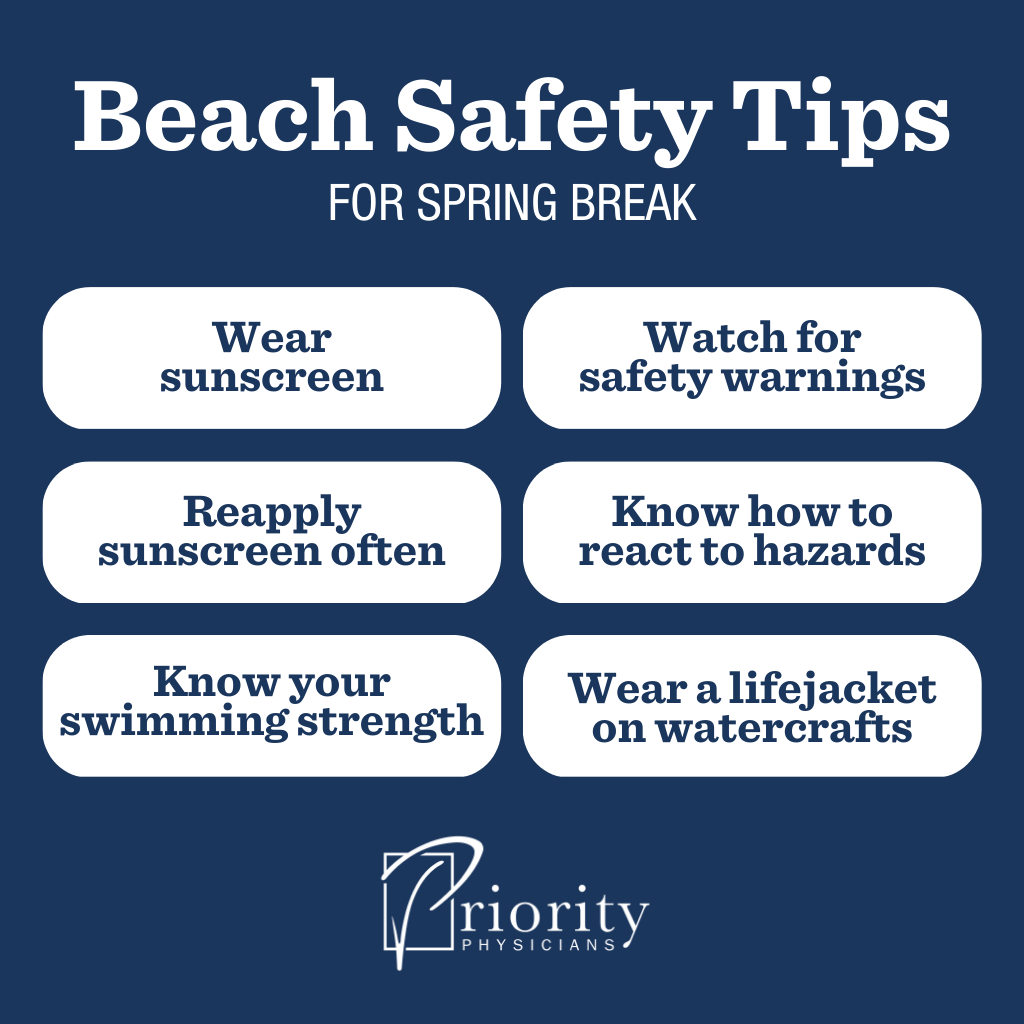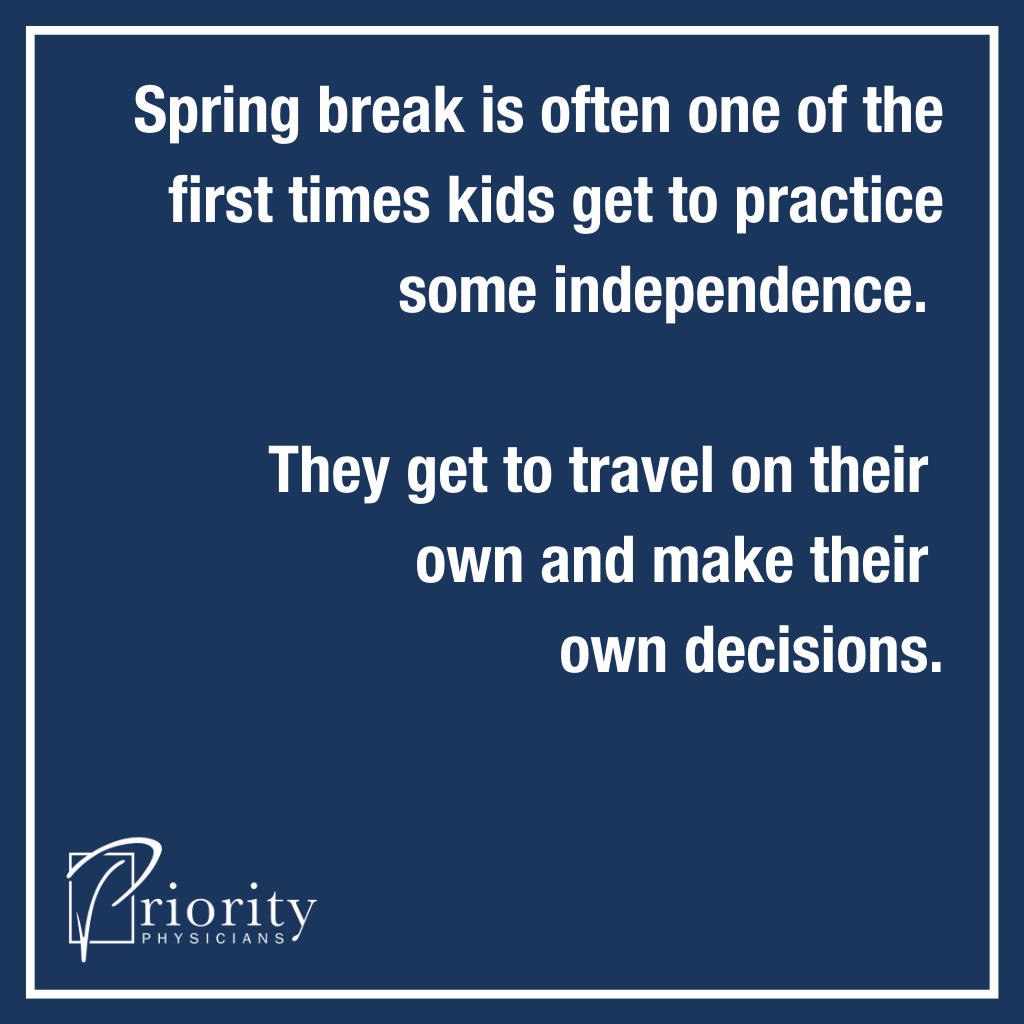Spring break is such a fun time of year. You can visit family and friends, travel somewhere new, and do something exciting and daring.
I know those of us in Indiana are ready to travel to warmer climates, but before you embark on your trip, it’s important to consider what risks you may face.
We’ve all seen news stories of kids getting into trouble on spring break — or even worse, having trouble find them. It’s important to stay safe on your vacation, and a little bit of forethought can keep you a lot safer.
Let’s review some common risks and how you can avoid them.
Alcohol Safety
I don’t need to tell you the potential risks of overconsuming alcohol. What I’ll tell you instead is how to reduce your risk of overconsumption in the first place.
If you’re on a spring break trip, you’re probably in an unfamiliar environment and surrounded by strangers. Add the fact that alcohol lowers your inhibitions, and you have a potentially dangerous combination.
The safest thing to do in such a situation would be to not drink alcohol, but the next best thing would be to limit your alcohol intake. Moderation is key.
Also, if you’re going to drink, do it with a friend — someone you know and who can hold you accountable for your consumption. It’s even better if that person stays sober themselves, so they can clearly monitor your wellness and your environment.
Underage children especially should limit opportunities and access to alcohol. Kids can make dumb decisions when they’re sober, and adding alcohol to the mix doesn’t help. If kids are going to drink on vacation, they need a safe and supervised environment.
Staying aware of your surroundings — and where your drinks are coming from — is another key safety strategy. Know what’s in your drink, even if that means watching a bartender make it or cracking open a can yourself.
The possibility of being drugged is a frightening one, even more so in an unfamiliar environment. Minimize that risk by refusing drinks from strangers and keeping a close eye on your beverage at all times.
Food Safety
In addition to involving a few extra beers or cocktails, spring break typically heralds some changes in eating habits. I get it — on vacation, the last thing you want to do is go to the grocery store and cook a meal. Instead, you’ll probably be eating out more than usual, and as you do, there are a few things to keep in mind.
Most people overeat on vacation. Portion sizes at restaurants are often out of control, and delicious snacks throughout the day are part of the experience. But overeating can lead to an upset stomach, constipation, heartburn, and diarrhea — all of which take the fun out of a spring break trip.
The quantity of food you consume is only part of the battle. It’s exciting to try new foods and drinks on vacation, but be mindful of how many new things you’re putting into your body. You could suffer from food allergies or sensitivities from ingredients you’re not normally exposed to at home.
In addition, your food and drinks may be prepared differently in a new place. The food might not be fully cooked, and the drinking water in some countries can lead to illness. Even if you don’t drink from the tap, local water can contaminate your food or get into drinks in the form of melting ice.
One of the best ways to minimize your risks is to learn where your food comes from. Evaluate restaurants and vendors carefully before you decide to sample the local cuisine.
Sexual Health
It’s not news that alcohol and drugs can lower your inhibitions. For a lot of kids, that means lower inhibitions toward high-risk sexual behavior.
In unplanned and unprepared sexual situations, there’s a wildly increased risk of STD and STI transmission. The odds of knowing a partner’s sexual health history and using proper prevention methods are lower, which elevates the risk. Beyond that, consent from all parties isn’t always a given in these situations.
There are people who travel to spring break destinations with the intent of taking advantage of younger people who might have less experience with drugs and alcohol. Spring break trips are a prime opportunity for people to be caught off guard and taken advantage of. Above all else, be smart, know the risks, and make good choices.

Skin and Water Safety
If you’re migrating to a warmer place for spring break, congratulations on escaping the cold. With that in mind, for us Indianans, our skin is very different in March and April compared to July and August. You’re more likely to get a sunburn during this time because you haven’t yet had much sun exposure for the year.
If you’re going from a permacloud in Indiana to a sunny destination, use a generous amount of sunscreen. And remember, sunscreen comes off while you’re enjoying yourself, especially if it isn’t waterproof. To avoid a burn, be sure to reapply sunscreen multiple times throughout the day.
If your itinerary also involves some time in the ocean, make sure you stay safe while you’re taking a dip. If you’re going to play in the water, know how good of a swimmer you are ahead of time, and be conscientious if you’re literally in over your head. Pay attention to any water safety warnings, such as for rip currents (rip tides), and if you get caught in one, swim parallel to shore to get out of the current.
If you’re going out on any kind of watercraft — a jet ski, boat, etc. — make sure you’re wearing a properly fitted lifejacket, even if it doesn’t look cool. A lifejacket can’t help you if it’s sitting on the floor of a boat (or if it’s so big it slides right off). But if you bump your head falling into the water, a lifejacket can keep you safe, even if you’re unconscious.
Travel Packs
An ounce of prevention is worth a pound of cure. If you’re travelling to a country where English isn’t spoken, there’s nothing worse than feeling ill and standing in a pharmacy trying to decipher medicine labels in a language you don’t understand.
Things happen, and there’s no reason for you to suffer while on vacation. If you call our office before your trip, we can get you set up with a travel pack that will treat most of the common conditions you might encounter. Plus, a travel pack you bring with you will contain simple directions written in English.
Tips for Advising Your Teen
All these risks aside, spring break is often one of the first times kids get to practice some independence. They get to travel on their own and make their own decisions. It’s good to have teens practice those skills without too much restriction, because part of becoming a functioning adult is making mistakes and learning how to respond to them.
No kid in history ever became an adult perfectly. You made some mistakes and ended up alright; your kids can, too. It’s better to provide guidance and teach kids responsible behaviors than to always tell them “no” and take away all opportunities for growth.
They’re going to make some mistakes, but you can limit the frequency and severity of those mistakes — probably more effectively than you realize.
Spring Break Safety: Final Thoughts
Spring break vacations are an exciting opportunity to make new memories, but they also present a lot of new variables and, sometimes, dangers.
If you apply the tips we’ve discussed, you can minimize your risks, stay happy, and enjoy your vacation safely.


